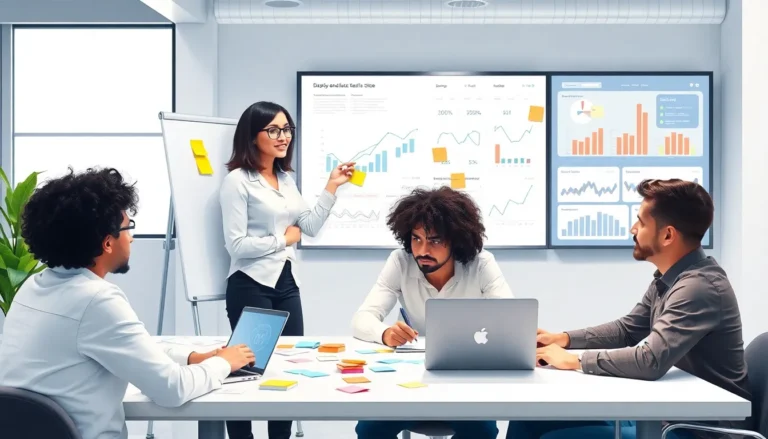Table of Contents
ToggleImagine a world in 2050 where your coffee maker knows your mood better than your best friend. As technology races forward, the future promises to be a wild ride filled with innovations that seem straight out of a sci-fi movie. From self-driving cars that argue over the best route to AI assistants that can finally handle your in-laws, the landscape of daily life is set to change dramatically.
Future Technology Predictions 2050
In 2050, technology transforms how people live and interact. Devices connect seamlessly, enhancing everyday experiences. Coffee makers recognize emotional states, adjusting brew strength or flavor to elevate mood. Self-driving cars engage in route discussions, optimizing travel based on real-time data and passenger preferences.
AI assistants evolve into intuitive companions, managing complex social interactions with ease. These systems facilitate scheduling, prioritize tasks, and suggest conversation topics, creating harmonious environments. Virtual reality becomes an integral part of social life, allowing people to meet in digital spaces that feel remarkably real.
Healthcare experiences revolutionary changes through advanced diagnostics and personalized treatments. Wearable technology continuously monitors health metrics, sending alerts and recommendations directly to caregivers. Telemedicine becomes the norm, enabling immediate access to specialized care regardless of geographical barriers.
Smart homes utilize comprehensive interconnectivity. Appliances communicate with one another to manage energy usage efficiently. For instance, washing machines might delay cycles based on peak energy consumption, promoting sustainability.
Education undergoes a dramatic shift as well. Classrooms blend virtual and physical elements, enabling immersive learning experiences that cater to individual needs. This approach fosters creativity and critical thinking, preparing students for the demands of an evolving job market.
As technology evolves in 2050, ethical considerations take center stage. Society has discussions about privacy, consent, and the ethical use of AI. Accountability structures are established to ensure technology serves humanity positively, promoting well-being and creativity.
Artificial Intelligence Advancements

Artificial intelligence (AI) will experience remarkable advancements by 2050, transforming many aspects of life.
Machine Learning Breakthroughs
Breakthroughs in machine learning enhance algorithm efficiency and predictive capabilities. Continuous data processing leads to systems that not only learn but also adapt in real-time. Improvements in natural language processing result in more nuanced understanding of human conversation. These developments support applications ranging from medical diagnostics to weather forecasting. Enhanced personalization features enable tailored user experiences in various sectors. Medicine benefits tremendously, with AI predicting patient outcomes based on historical data patterns. Ultimately, advancements in machine learning significantly refine decision-making processes.
AI in Everyday Life
AI integrates seamlessly into daily routines, making tasks simpler and more intuitive. Smart assistants manage schedules and control home environments, anticipating user needs. Wearable devices track health metrics and provide actionable insights instantly. Self-driving vehicles optimize routes through conversation and instant data sharing. Kitchen appliances adjust cooking methods based on preferences and dietary restrictions. Public services leverage AI to improve response times and resource allocation. The presence of AI creates a more efficient, responsive, and engaging society, influencing how individuals interact with their environments.
Transportation Innovations
Transportation in 2050 undergoes radical transformations powered by cutting-edge technology. Innovations like autonomous vehicles and advanced transport systems reshape the way people travel.
Autonomous Vehicles
Autonomous vehicles revolutionize road travel by 2050. Self-driving cars use advanced AI algorithms to ensure safer and more efficient transportation. These vehicles negotiate real-time traffic data, adapting routes to minimize delays. Passengers benefit from increased convenience, allowing them to engage in other activities during commutes. The infrastructure supports this evolution, with smart traffic signals coordinating with vehicles to enhance flow.
Hyperloop and Beyond
Hyperloop technology dramatically alters long-distance travel. This system employs magnetic levitation to achieve high speeds, drastically reducing travel time between cities. In 2050, hyperloop networks connect metropolitan areas, making it feasible to commute hundreds of miles in mere minutes. Beyond hyperloop, advanced drone delivery services emerge, transporting packages with remarkable efficiency. The convergence of these innovations leads to a seamless transportation ecosystem, enhancing connectivity and access for communities.
Renewable Energy Developments
In 2050, advancements in renewable energy significantly reshape global energy systems, focusing on efficiency and sustainability.
Solar and Wind Innovations
Solar technology advances with highly efficient photovoltaic cells producing energy even in low light. Wind turbines evolve, featuring larger blades and enhanced designs for maximum energy capture. These innovations lead to a dramatic increase in energy output. Many regions achieve 100% renewable energy, relying predominantly on solar and wind sources. Integration of energy storage systems aids in managing fluctuations. Smart grids enhance energy distribution and consumption patterns, ensuring that power reaches where it’s needed. These technologies combine to create a reliable and resilient energy framework.
Fusion Energy Prospects
Fusion energy shows great promise in becoming a game changer by 2050. Researchers develop reactors that harness the power of fusion, mimicking the sun’s energy production. High-profile projects achieve breakthroughs in sustaining reactions, resulting in safe and clean energy. Energy yield from fusion reactions surpasses current renewable capabilities, offering a nearly limitless power source. While challenges remain, ongoing developments fuel optimism around cost-effective fusion energy solutions. Ultimately, this could lead to a sustainable energy revolution, reducing reliance on fossil fuels and curbing environmental impact.
Health and Medicine Evolution
Health and medicine significantly evolve by 2050 through groundbreaking advancements. Innovations like genetic engineering and wearable health technology play crucial roles in enhancing patient care.
Genetic Engineering and CRISPR
Genetic engineering achieves remarkable feats, primarily through CRISPR technology. This precise method allows scientists to edit genes accurately, targeting diseases at their source. Applications of CRISPR include eradicating genetic disorders and personalizing treatments based on individual DNA profiles. Researchers observe rapid progress in regenerative medicine, driven by advancements in gene editing techniques. Trials show promise for curing conditions previously deemed untreatable. Ethical discussions emerge alongside these advancements, emphasizing responsible use and long-term impacts on human health.
Wearable Health Technology
Wearable health technology transforms monitoring and managing health. Devices capable of tracking vital signs and activity levels in real-time become commonplace. These gadgets provide users immediate feedback about their health, allowing proactive adjustments to lifestyle choices. Integration with telemedicine services enhances doctor-patient communication, enabling more timely interventions. Studies highlight the effectiveness of wearable technology in managing chronic diseases such as diabetes and hypertension. Data collected from these devices contribute to comprehensive health records, enriching personalized medical care.
Smart Cities and Urban Planning
Smart cities emerge as interconnected urban environments where technology enhances living standards. Innovations, such as real-time data analytics, optimize public services and improve residents’ quality of life.
IoT Integration
IoT integration facilitates seamless communication among devices in smart cities. Sensors monitor traffic patterns, enhancing congestion management. Smart streetlights adjust brightness based on pedestrian presence, improving safety while reducing energy consumption. Waste management benefits from IoT applications, with smart bins indicating fill levels for efficient collection. Moreover, smart grids enable efficient energy distribution, reducing costs and improving reliability. These interconnected systems foster environmental sustainability and elevate urban living.
Sustainable Architecture
Sustainable architecture plays a vital role in future urban planning. Buildings incorporate recycled materials, minimizing environmental impact while promoting energy efficiency. Green roofs reduce heat absorption and encourage biodiversity in urban areas. Designers utilize modular construction techniques, enabling flexibility in space use and resource efficiency. Solar panels increasingly feature as standard in new buildings, harnessing renewable energy and reducing reliance on fossil fuels. This approach cultivates healthier urban environments, addressing climate change and enhancing resilience.
The vision for 2050 reveals a world where technology not only enhances daily life but also reshapes fundamental aspects of society. As innovations in AI healthcare and renewable energy evolve the landscape of human interaction and environmental responsibility, the potential for a more connected and sustainable future emerges.
Ethical considerations will play a crucial role in guiding these advancements ensuring that technology serves humanity positively. With smart cities and personalized healthcare becoming the norm the future holds immense promise for improving quality of life. Embracing these changes will pave the way for a more efficient and engaging society fostering creativity and well-being for all.








